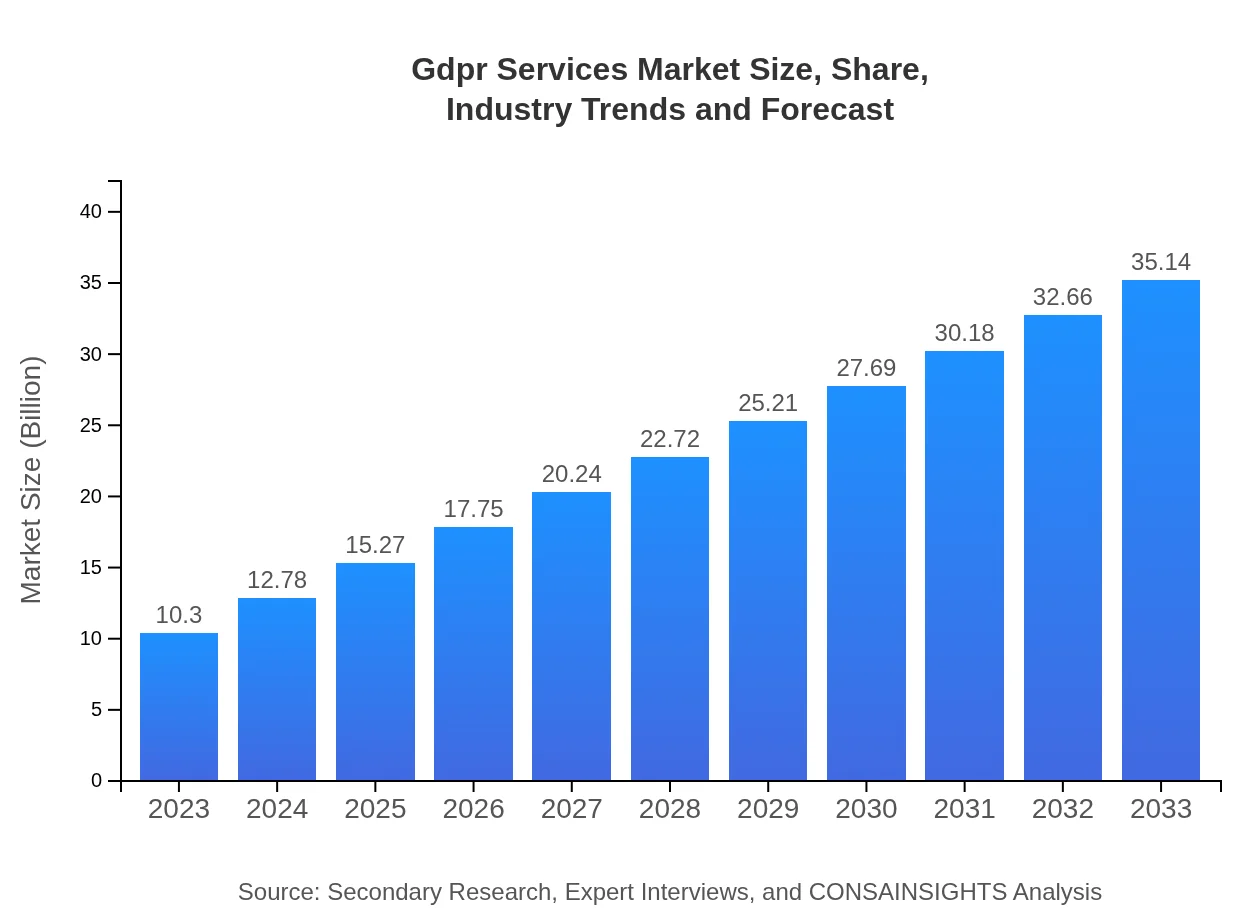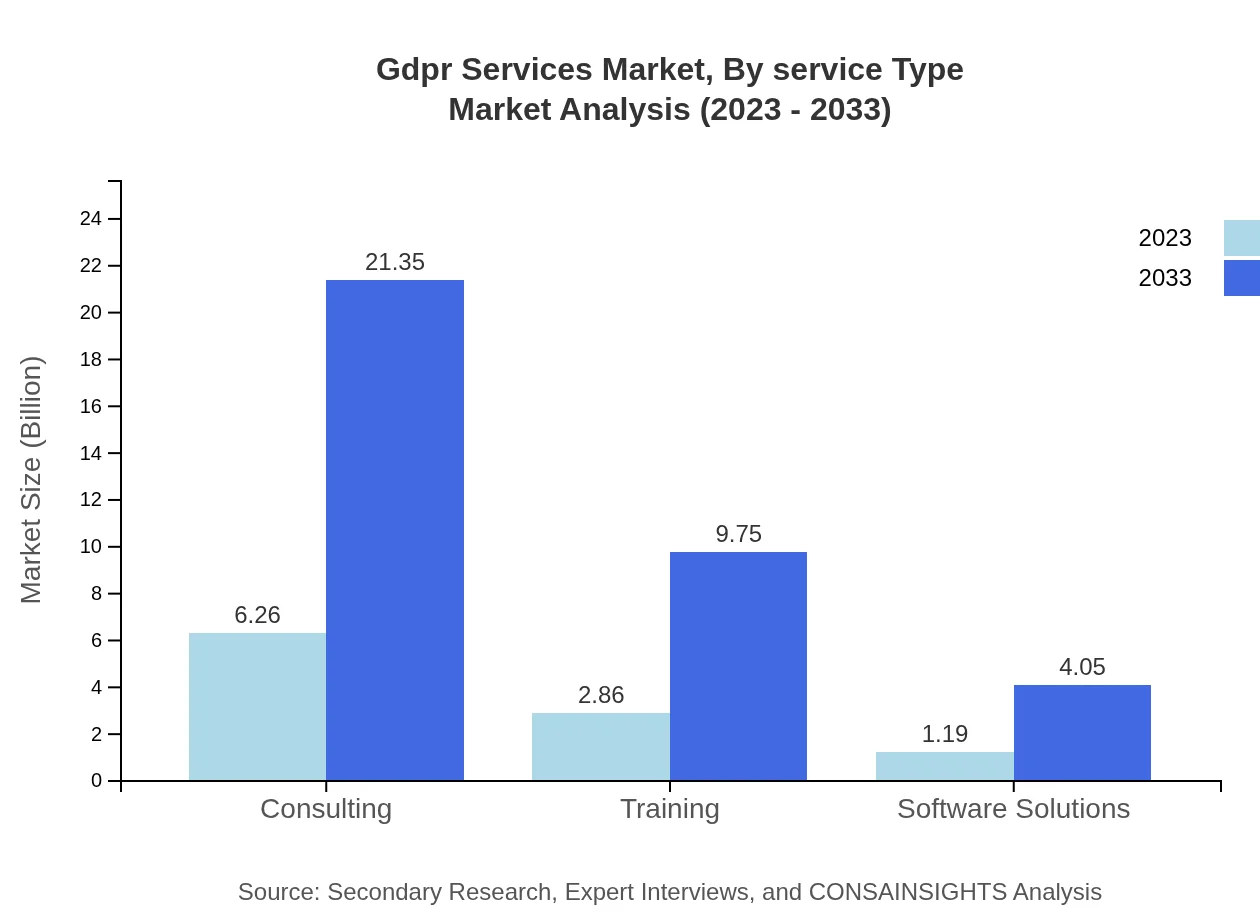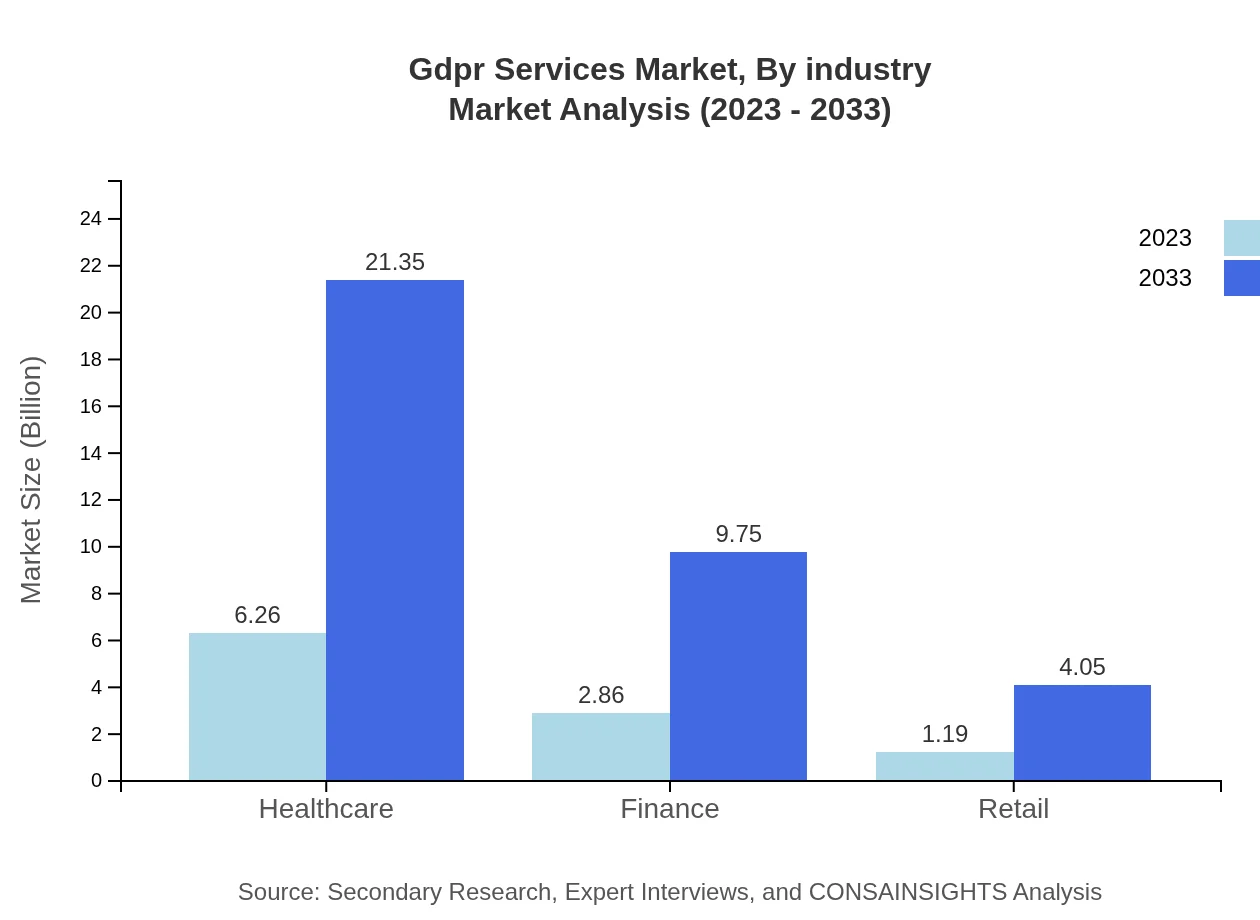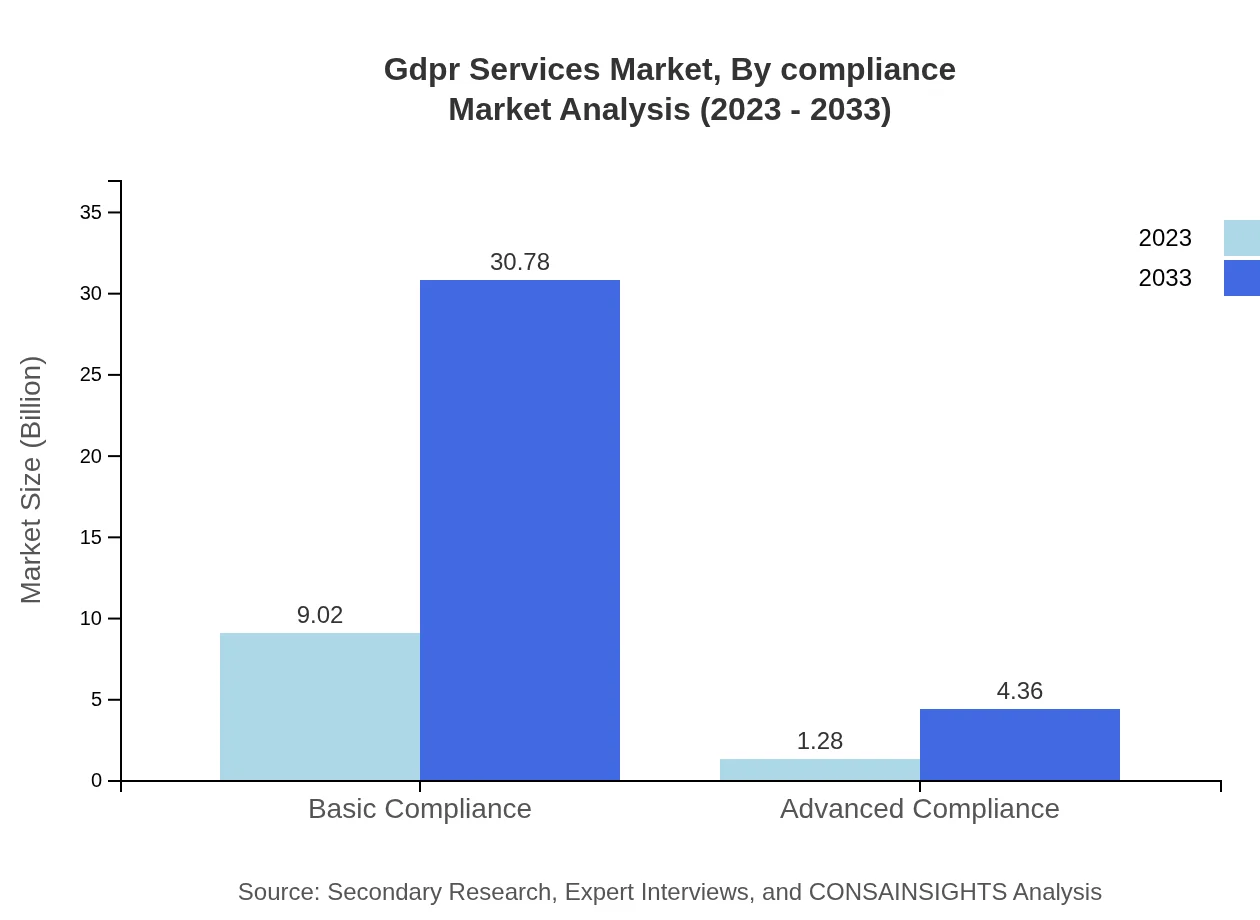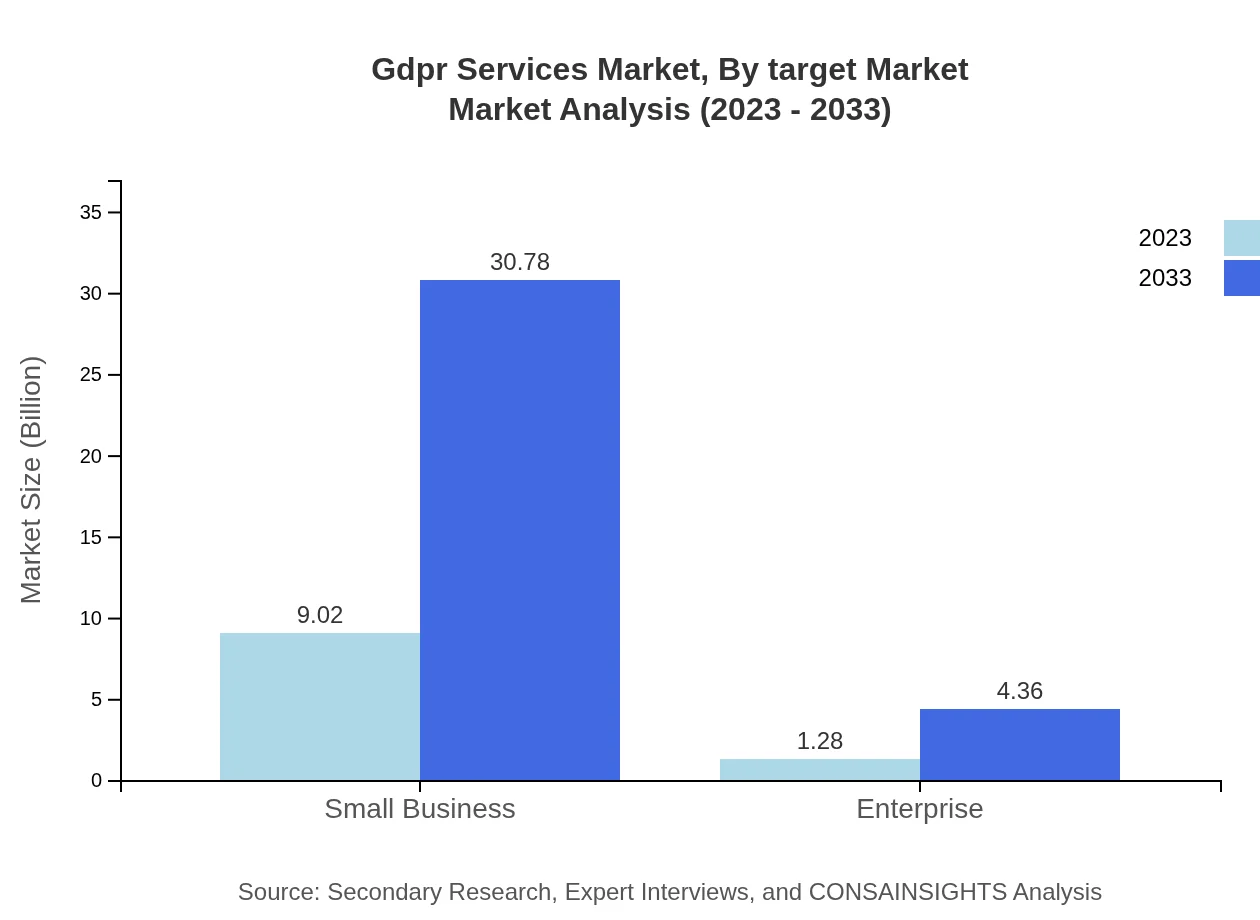Gdpr Services Market Report
Published Date: 31 January 2026 | Report Code: gdpr-services
Gdpr Services Market Size, Share, Industry Trends and Forecast to 2033
This report provides a comprehensive analysis of the GDPR services market, covering current trends, market size, segmentation, and regional insights. It forecasts the market developments from 2023 to 2033.
| Metric | Value |
|---|---|
| Study Period | 2023 - 2033 |
| 2023 Market Size | $10.30 Billion |
| CAGR (2023-2033) | 12.5% |
| 2033 Market Size | $35.14 Billion |
| Top Companies | Deloitte, PwC, KPMG, IBM, Accenture |
| Last Modified Date | 31 January 2026 |
Gdpr Services Market Overview
Customize Gdpr Services Market Report market research report
- ✔ Get in-depth analysis of Gdpr Services market size, growth, and forecasts.
- ✔ Understand Gdpr Services's regional dynamics and industry-specific trends.
- ✔ Identify potential applications, end-user demand, and growth segments in Gdpr Services
What is the Market Size & CAGR of GDPR Services market in 2023?
Gdpr Services Industry Analysis
Gdpr Services Market Segmentation and Scope
Tell us your focus area and get a customized research report.
Gdpr Services Market Analysis Report by Region
Europe Gdpr Services Market Report:
Europe remains the epicenter of the GDPR services market, with sizes rising from 2.87 billion USD in 2023 to 9.79 billion USD by 2033. The stringent enforcement of GDPR has essentially created a market where compliance-related services are indispensable for business continuity.Asia Pacific Gdpr Services Market Report:
The Asia-Pacific region is expected to display robust growth in the GDPR services market, increasing from 2.03 billion USD in 2023 to 6.92 billion USD by 2033. This growth is fueled by rising data breaches and increasing privacy regulations in countries like India and Japan, driving organizations to seek GDPR compliance.North America Gdpr Services Market Report:
North America is projected to lead the market, expanding from 3.82 billion USD in 2023 to 13.03 billion USD by 2033. The region's strong emphasis on data privacy laws and the presence of numerous businesses handling vast amounts of personal data underscore the demand for GDPR compliance solutions.South America Gdpr Services Market Report:
In South America, the GDPR services market is anticipated to grow from 0.49 billion USD in 2023 to 1.66 billion USD by 2033. Growing internet penetration and digital transformation initiatives are prompting businesses to adopt stringent data protection measures, thereby enhancing the demand for compliance services.Middle East & Africa Gdpr Services Market Report:
The Middle East and Africa market will grow from 1.10 billion USD in 2023 to 3.75 billion USD in 2033, fueled by a growing focus on data protection and privacy rights amid increasing digital adoption and awareness.Tell us your focus area and get a customized research report.
Gdpr Services Market Analysis By Service Type
In 2023, the consulting segment of the GDPR services market will be valued at 6.26 billion USD, escalating to 21.35 billion USD by 2033, holding a market share of 60.74%. Basic compliance services dominate, projected to grow from 9.02 billion USD in 2023 to 30.78 billion USD by 2033. Advanced compliance services will show a smaller but significant increase from 1.28 billion USD to 4.36 billion USD.
Gdpr Services Market Analysis By Industry
The healthcare sector will witness an increase from 6.26 billion USD in 2023 to 21.35 billion USD by 2033, capturing a significant share of 60.74%. The finance sector, although smaller, will grow from 2.86 billion USD to 9.75 billion USD, with a 27.75% share. Retail will also expand from 1.19 billion USD to 4.05 billion USD, securing 11.51% of the market.
Gdpr Services Market Analysis By Compliance
The basic compliance segment accounts for 87.58% with growth from 9.02 billion USD in 2023 to 30.78 billion USD by 2033. Advanced compliance services, whilst smaller, are projected to increase from 1.28 billion USD to 4.36 billion USD, making up 12.42% of market share.
Gdpr Services Market Analysis By Target Market
Small businesses, leading the segment, are expected to grow significantly from 9.02 billion USD in 2023 to 30.78 billion USD by 2033 with a consistent market share of 87.58%. Enterprises, albeit smaller, are projected to rise from 1.28 billion USD to 4.36 billion USD, comprising 12.42%.
Gdpr Services Market Trends and Future Forecast
Tell us your focus area and get a customized research report.
Global Market Leaders and Top Companies in GDPR Services Industry
Deloitte:
Deloitte offers comprehensive GDPR compliance consulting services, helping organizations navigate complex regulations and implement effective data protection strategies.PwC:
PwC delivers innovative technology solutions and expert compliance advisory services, ensuring that clients achieve GDPR compliance seamlessly.KPMG:
KPMG provides a range of GDPR consulting and compliance services, leveraging its vast industry expertise to help businesses manage data privacy risks effectively.IBM:
IBM offers advanced technology solutions for data protection, assisting organizations in aligning with GDPR requirements and enhancing data security.Accenture:
Accenture specializes in GDPR strategy and technology implementation services, empowering businesses to optimize compliance processes.We're grateful to work with incredible clients.









FAQs
What is the market size of gdpr Services?
The GDPR services market is valued at $10.3 billion in 2023, with an anticipated CAGR of 12.5% through 2033. This growth reflects increasing compliance needs across various sectors, fueling demand for GDPR-related services globally.
What are the key market players or companies in this gdpr Services industry?
Key players in the GDPR services industry include major compliance consultancies, software providers, and legal firms specializing in data protection. Their offerings range from consulting to software solutions, catering to diverse client needs in GDPR compliance.
What are the primary factors driving the growth in the gdpr Services industry?
Primary factors driving market growth include escalating regulatory pressures for data protection, heightened consumer awareness of privacy rights, and increased cyber threats. Organizations are compelled to invest in GDPR compliance to mitigate risks and fulfill legal obligations.
Which region is the fastest Growing in the gdpr Services?
The fastest-growing region for GDPR services is North America, projected to grow from $3.82 billion in 2023 to $13.03 billion by 2033. This growth is attributed to stringent regulations and a heightened focus on data privacy.
Does ConsaInsights provide customized market report data for the gdpr Services industry?
Yes, ConsaInsights offers customized market report data tailored to specific needs within the GDPR services industry. This includes detailed insights on regional markets, segments, and competitor analysis to assist businesses in strategic planning.
What deliverables can I expect from this gdpr Services market research project?
From this market research project, expect comprehensive reports including market size analysis, growth forecasts, competitor landscapes, and segmentation insights. Detailed data visualizations and actionable recommendations will also be included.
What are the market trends of gdpr Services?
Current market trends in GDPR services highlight a shift towards advanced compliance solutions, increased investment in software tools, and a focus on small to medium business needs. Training and consulting services are experiencing rising demand as well.

